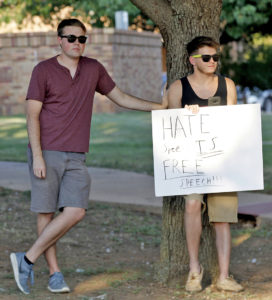
The Resist Hate Rally was almost over. About 30 students, faculty and staff started at Sunwatcher Plaza. They set off to walk around campus at 5:30 p.m. on a warm Friday afternoon with Labor Day weekend quickly approaching. They were almost back to the start as two others stood off to the side, holding a sign that read, “hate speech is free speech.”
The Sept. 1 rally attracted many students, as well as members of the community such as Kalli Root, constructer of the rally, who invited Nick Wolf, mechanical engineering junior, to attend. Wolf stood at the end of the rally holding a sign high above his head with the words “hate speech is free speech” written in bold black ink.
Wolf was one of few people at the rally that was not in favor for the outlawing of hate speech.
“We were in no way promoting hate, we just had different opinions and wanted to debate more on that,” Wolf said.
Hate speech can be defined in many different ways.
“I don’t think you really can define hate speech,” Wolf said. “That is the problem with trying to outlaw hate speech, because it is so subjective and vague. I guess you could say hate speech is something that offends someone.”
Banning hate speech is difficult to do, because hate speech is not easily defined.
“If we ban hate speech, it would be up to certain government officials to interpret what offends a certain person, and then that could be used to silence people’s unpopular opinions,” Wolf said.
Anti-hate speech organizations argue that hate speech leads to violence and threats. Although Wolf does not encourage acts of violence, he does believe that he should be able to say what he wishes without fear of hurting someone’s feelings.
“You should draw the line when there is an intent to harm someone, but you don’t have the right not to be offended,” Wolf said.
In 2012, the Supreme Court refused to hear a case having to do with the freedom of speech. A student from Central Lakes College’s nursing school posted on Facebook calling his classmate an offensive name, along with a status about anger management and alcohol. He was expelled from the college shortly after the incident.
The Supreme Court didn’t hear the case when presented with it. Groups that supported free speech were very upset about the outcome of the scenario, as they had urged the Supreme Court to refrain from allowing colleges to punish their students for speaking freely.
“The Supreme Court recently reaffirmed their bedrock principle, which basically states that speech may not be banned on the ground that it just offends someone,” Wolf said.
Craig Dublin, mechanical engineering junior, feels differently about the impact of hate speech.
“People should be able to say what they want to a certain degree,” Dublin said.
Dublin understands that the he is entitled to his own opinion, and he can express his beliefs without penalty. But he does not find it necessary to belittle others in any way.
“Racism, for example, is not okay. Racism is the line, but also bashing another person’s religion. You can disagree with a belief, but you shouldn’t belittle others because they believe a certain way,” Dublin said.
Mike Hiestand, Student Press Law Center legal consultant, listed the exceptions to the First Amendment.
“While these are the main forms of speech that are not protected, there are a couple dozen or more unprotected forms of speech,” Hiestand said.
He started with the most known exceptions, such as obscenity, slander, defamation, child pornography, perjury and blackmail.
“One of these categories is referred to as fighting words. An example of fighting words would be getting in a man’s face, making racist remarks and suggesting that he wouldn’t punch me— trying to provoke him to punch me— that is not protected,” Hiestand said.
Hiestand shared that true threats are another example of speech that is against the law. True threats result in a legitimate intent to commit violence.
“If a student posted on a blog specifically saying who he or she was targeting to kill- that is a true threat, and that is not protected speech,” Hiestand said.
Closely related to true threats is imminent legal conduct.
“In imminent legal conduct, you are looking for a physical gun in someone’s car rather than an ‘I am going to kill you,'” Hiestand said.
While Hiestand does not believe in “hate speech,” he said he understands what the term is referring to. He suggests that hate speech is just mean and impolite.












